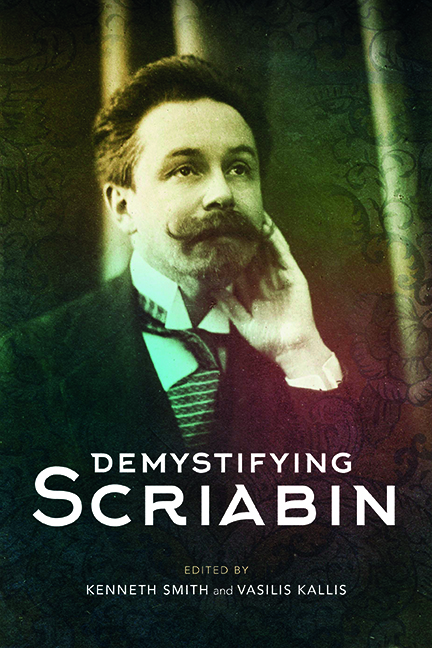4 - Russian Pedagogy in Composition and Music Theoryduring Scriabin’s Creative Period
Published online by Cambridge University Press: 07 October 2022
Summary
The Apprentice Pioneer
Alexander Scriabin is one of those composers, likeArnold Schoenberg, Béla Bartók, and Igor Stravinsky,whose creative careers began at the end of the eraof Romanticism but, through a deep transformation oftheir musical thinking, created the new language ofthe twentieth century. Each of these composers, to agreater or lesser extent, began composing within oneor another musical tradition of late Romanticism,yet each adopted an oppositional stance to thattradition, going beyond the scope of the establishedtechniques of composition that were obligatory to ayoung composer's training in Russia. The role that acomposer's training plays in his/her developmentneeds to be considered very carefully. Regardingtuition in the craft of composition, this roleshould not be overestimated, and the creator'singenious discoveries should not be understood as astraightforward cause-and-effect of schooleducation. After all, the composer's individuality,various ‘out-of-school’, ‘extra-curricular’, andeven extra-musical influences – for example, thoseof the circle of Symbolist poets on Claude Debussy,or Sergei Diaghilev's RussianSeasons on Igor Stravinsky – are crucial.At the same time, the role of a composer-mentor whoimparts a certain ‘science’ – in the meaning of thecraft, particularly the method of composition – isconfirmed by the presence of only a few greatcomposers-teachers’ names who have nurtured entiregroups of major composers. We might think of MiliĭBalakirev (the teacher of Modest Musorgskiĭ, NikolaĭRimskiĭ-Korsakov, and Aleksandr Borodin), NikolaĭRimskiĭ-Korsakov (the teacher of Anatoliĭ Liadov,Aleksandr Glazunov, and Igor Stravinsky), ArnoldSchoenberg (the teacher of Alban Berg, Anton Webern,and Ernst Krenek), Nadia Boulanger (the teacher ofDarius Milhaud, George Gershwin, and LeonardBernstein), and Olivier Messiaen (the teacher ofPierre Boulez, Karlheinz Stockhausen, and YannisXenakis). The power and significance of thesepedagogues lay in the fact that, while they nurturedsuch composers, they were also deeply embedded inthe contemporaneous artistic tradition and weresensitive to the cultural demands of their time.This attitude was reflected in Mahler's famous wordsaddressed to Schoenberg: ‘Make these people readDostoevsky. This is more important thancounterpoint.’ Balakirev's favourite thesis was thatconservative routine is generally harmful to thenatural formation of a new style and a newpersonality. The statement is more thancontroversial, but the fact that such pioneers asMusorgskiĭ, Borodin, and Rimskiĭ-Korsakov appearedin the bosom of Balakirev's circle more thaneloquently proves the point of the head of the NewRussian School.
- Type
- Chapter
- Information
- Demystifying Scriabin , pp. 64 - 80Publisher: Boydell & BrewerPrint publication year: 2022



